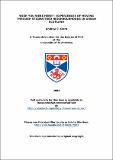Files in this item
Wish you were here?: experiences of moving through stigmatised neighbourhoods in urban Scotland
Item metadata
| dc.contributor.advisor | Boyle, Paul | |
| dc.contributor.author | Clark, Andrew J. | |
| dc.coverage.spatial | 513 | en_US |
| dc.date.accessioned | 2015-07-31T10:45:52Z | |
| dc.date.available | 2015-07-31T10:45:52Z | |
| dc.date.issued | 2004 | |
| dc.identifier | uk.bl.ethos.494028 | |
| dc.identifier.uri | https://hdl.handle.net/10023/7087 | |
| dc.description.abstract | This thesis is about the use of the term social exclusion in contemporary Scotland and how it has given rise to the idea of 'excluded spaces' in political and academic commentaries on deprived neighbourhoods. It argues that, despite criticism, the term offers a useful way of re-assessing disadvantaged places, such that space (for example, in the guise of socio-spatial segregation) should be considered not only an outcome but also an input into processes of exclusion. This is illustrated through exploration of the reproduction of the frequently negative place-images surrounding two deprived neighbourhoods in urban Scotland. The thesis explores how such representation may stigmatise residents therein, ultimately resulting in the production of landscapes of exclusion. Use of a range of qualitative methods (though primarily biographical interviews) demonstrates how negative place-images are constructed and remain resilient to change while also revealing the concrete outcomes of such 'imagined' geographies. Overall, the thesis makes three main points. First, that the construction of 'imagined' and 'real' places are fluid and dynamic processes and differences between 'images' and 'realities' of places are neither as clear cut, nor as 'true' or 'inaccurate' as might be assumed. Second, that 'real' and 'imagined' representations of place are reproduced through practices in, and attitudes towards, place. And third, that migration processes are influenced by, and influential to, the construction of social and place identities. Construction of socio-spatial stereotypes reveals space to be both an outcome and input into processes of exclusion while also demonstrating how many of the taken-for-granted assumptions about disadvantaged neighbourhoods might be considered place-myths. | en_US |
| dc.language.iso | en | en_US |
| dc.publisher | University of St Andrews | |
| dc.subject.lcc | HT133.C52 | |
| dc.subject.lcsh | Marginality, Social -- Scotland | en_US |
| dc.subject.lcsh | Urban geography -- Scotland | en_US |
| dc.subject.lcsh | Urban poor -- Scotland -- Social conditions | en_US |
| dc.subject.lcsh | Social isolation -- Scotland | en_US |
| dc.title | Wish you were here?: experiences of moving through stigmatised neighbourhoods in urban Scotland | en_US |
| dc.type | Thesis | en_US |
| dc.type.qualificationlevel | Doctoral | en_US |
| dc.type.qualificationname | PhD Doctor of Philosophy | en_US |
| dc.publisher.institution | The University of St Andrews | en_US |
This item appears in the following Collection(s)
Items in the St Andrews Research Repository are protected by copyright, with all rights reserved, unless otherwise indicated.

